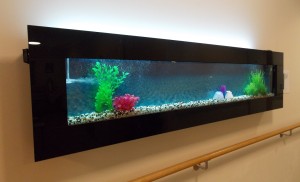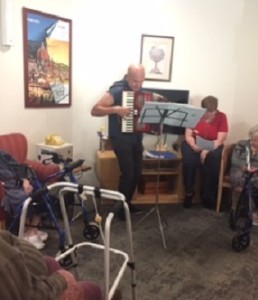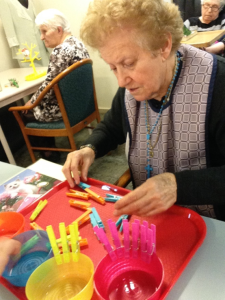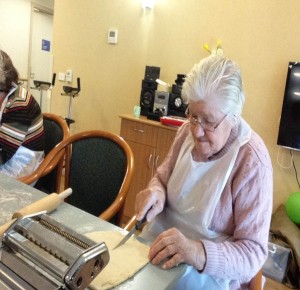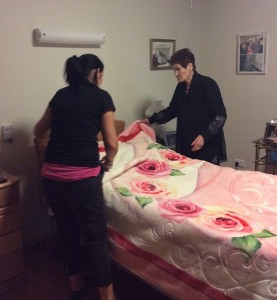The Montessori Approach to Care
As part of our 3 year strategic plan, one of our key priorities is to review our Model of Care. It was late 2015 when I held a meeting with the Quality and Risk Manager, Sheila Cheary and the Lifestyle Coordinator, Penelope Aunger to discuss an education session they attended on the Montessori Approach to Care. It occurred to me that I needed to attend myself to get a better understanding and it was when I was attending this session that I realised, as the Director of Care, if I wanted this new approach for our residents, it wasn’t good enough to have a few key staff in clinical care and lifestyle involved, but all our staff.
It was soon after that we decided to plan for the implementation of this new approach into our memory support unit, St Claire, with the assistance of Alzheimer’s Australia.
We commenced the program in early August 2016 with the assistance of Alzheimer’s Australia consultants, Wendy Henderson and Lyn Barr.
We are grateful to The Lorenzo & Pamela Galli Charitable Trust for their generous donation towards this important program and for their ongoing support of the Assisi Centre.
Laying the Foundation was challenging!
In the beginning staff and family attendance to education sessions was mediocre. Feedback from families was difficult to receive and there was not much positive commentary at all. So we knew it would take a special group of staff to drive this. We set about choosing our Montessori Leadership Team; myself, Sheila Cheary, Nurse Manager, Monica Agnihotri, her Team Leader, Vicky Ivory, Pastoral Carer, Antoinette Andaloro, Lifestyle Coordinator, Penelope Aunger, St Claire staff, Nicole Bruce, Nibedan Baral, Kelly Medcraft and Tony Bernardo and a representative from the Catering Department, food Safety Supervisor, Ammar Yasir.
We laid the foundation using the 12 principles, implemented our ideas for engagement activities and roles and we could see the positive effects on the residents (and families). It was the Leadership Team who continued to help, support and communicate to the staff and families in St Claire over many months. We could see a dramatic change start to take effect in January, which I call the tipping point of the program for us.
The outcomes were amazing and it reflects our Model of Care Philosophy:-
- At the Assisi Centre we provide care and support with respect and compassion.
- We respect the uniqueness of each person in the Assisi Centre community and acknowledge the contribution each has made throughout their life.
- We recognise the importance of all relationships in the Assisi Centre.
- We commit to providing a homelike environment for the residents to enable them to live a life with meaning and purpose.”
Fiona Kool,
Director of Care
The 12 Principles of the Montessori Method
Relate, Motivate, Appreciate summarises the 12 key principles of the Montessori Method.
People with dementia are often confronted with what they can no longer do or with the mistakes that they make.Montessori principles are designed to focus on what they can still do.
This is a person centred approach focusing on the person’s capabilities, capturing their interest and showing them respect.
It is important that the focus includes building on the person’s strengths.
The principles are structured in the order that you will use them when interacting with a person with dementia.
- The activity should have a sense of purpose and capture the person’s interest.
- Always invite the person to participate.
- Offer choice whenever possible.
- Talk less. Demonstrate more.
- Physical skills; focus on what the person can do.
- Match your speed with the person you are caring for. Slow down!
- Use visual hints, cues or templates.
- Give the person something to hold.
- Go from simple tasks to more complex ones.
- Break a task down into steps; make it easier to follow.
- To end, ask: ‘Did you enjoy doing this?’ and ‘Would you like to do this again?’
- There is no right or wrong. Think engagement.
Practical Application
The initial step in implementing the Montessori Model of Care was introducing its Principles. These 12 principles of Montessori give us a good understanding of how we can engage residents in a meaningful way. Focus is placed on one principle each week and discussed daily with staff especially how it relates to the residents. We take it further by relating the principle to a specific resident each day. This allows us to gain a better understanding of how these principles can be applied in the day to day life of our residents.
Initially, the thought of implementing such a big project was overwhelming to some staff and family members. However, daily communication and discussion helped to relieve this anxiety.
Now that we have completed one cycle of implementing all 12 principles of Montessori, staff has become very confident with what they have been doing to help residents with meaningful engagement over the last 12 weeks. Staff has become much more aware of each resident’s strengths and interests, also being mindful of what the residents do not like to do.
Over time families have embraced the Montessori approach to care. Not only have they contributed some great ideas and suggestions but are also actively participating in engaging residents in activities such as baking, taking them out for walks and engaging them in singalongs. One particular family member, Mr Nazario Vocale, whose mother is a resident here, volunteers his time by entertaining the residents with his beautiful singing and music every Friday. He plays piano and sings for residents and has gathered quite a following. The residents not only love but also participate by actually singing along and dancing to all the songs with him. We are thankful to Nazario for his wonderful contribution.
In addition, we have set up a Montessori Board in the St Claire foyer, where the principle of the week is displayed, including any updates for upcoming celebrations, bus outings information, changes to the unit and also invitation for families to put forth any suggestions.
A lot of work is being done to make St Claire brighter and more inviting for our residents.
Most recently, a Café has been set up in St Claire so residents can socialise with their families whilst enjoying a cup of coffee. An aquarium now adorns the wall of the day room where residents like to spend most of their time. The residents, families and visitors are loving it!
Monica Agnihotri,
Nurse Manager St Claire
What a difference 282 days make!
Measuring outcomes from July 2016 to March 2017
A Different Approach to Risk Assessment was introduced
This involved examining risk benefits and considering risk as an essential part of life and independence.
Do the benefits of an activity outweigh the risks?
Risk Benefit analysis and assessment invites staff to consider how they can ENABLE exciting activity without unacceptable risk
Risk Benefit Assessment introduced-
- How will the resident benefit from the activity?
- What are the possible hazards?
- Who is at Risk? – Precautions in place to reduce risk
- Overall risk BENEFIT rating – low, medium or high.
The findings have been remarkable!
We have seen reductions in:
- Falls
- Incidences of challenging behaviour
- Complaints
- Use of strong medications
The positive effects on staff are also noteworthy:
- Increase in morale in unit
- Requests to work in unit
- Enthusiastic involvement of staff
Staff commitment to the care model
- Purposeful, strong and trusting team communications have developed- evidenced by meeting outcomes.
- The staff team are actively engaged in the development of activities of meaning to residents – evidenced by the activity logs of residents living in St Claire.
- 3 new staff have requested to transfer to work in Memory Support.
Going forward with the Montessori care model we will continue to measure outcomes as
implementation continues in St Claire Memory Support and development commences in St Francis High Care
Sheila Cheary,
Quality & Risk Manager

